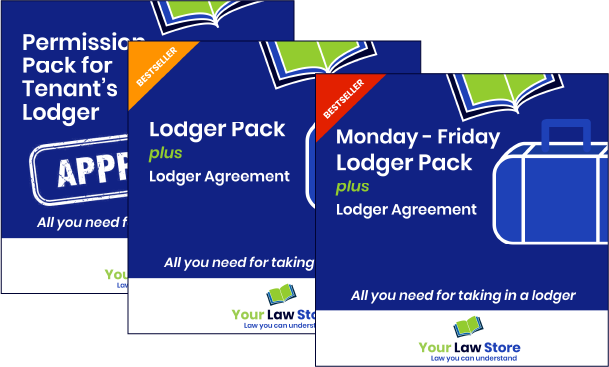Should you use a lodger agreement?
Should you use a lodger agreement? Short answer – yes!
Mind you, taking in a lodger is not the same as taking in a tenant, and you can sometimes get away without a lodger agreement. Many lodger landlords never use a formal written agreement and operate on a handshake and mutual trust.
However, although this is fine when things are going well, if there are any problems, it is a great help to have a formal agreement setting out your rights and obligations.
Unlike tenancies, these things are not normally ‘implied’ into agreements by statute, so if there is no written agreement, it can be difficult to know how to deal with problems that may arise.
A formal agreement drafted by a lawyer is therefore a good idea, in addition to any ‘house rules’ list you may draw up (discussed here). The formal agreement will cover things you may not have thought of, and will protect your position.
For example, a helpful clause, often found in lodger agreements, makes the lodger’s license to occupy the property end automatically, if he stops living in the property or fails to pay rent for two or more months.
Other standard clauses cover
- termination and notice periods,
- prohibitions about damaging the property and anti-social behaviour, and
- details of any services you will be providing.
Our agreement also includes a clause reminding the lodger that he is personally responsible for the behaviour of his guests (for example if they cause any damage).
The Unfair Terms Regulations
These are regulations (now part of the Consumer Rights Act 2015) that need to be taken into account when drafting consumer documents. They apply to all contacts (not just those for the occupation of property) between someone acting in the course of a business and a consumer.
In most situations where a homeowner (or tenant) is letting a room to a lodger, these regulations will not apply, as they are aimed at businesses, not people making a bit of money from renting out a room. However, if you have several lodgers, particularly if it is your main source of income, you might be classed as a business. If so, the regulations *will* apply to you.
This is why, when drafting our lodger agreements, we have taken the regulations into account, so they can be used by ‘business’ lodger landlords.
Generally. the thrust of the regulations is towards clarity and fairness. This is no bad thing, and if your lodger sees that the agreement you are using is evenhanded and doesn’t try to take advantage of him, he will be happier about signing it.
It is also a good idea to try to get an agreement which is written in plain English as this will be easier for both of you to understand.
Practicalities
If you decide to use a professionally drafted agreement (and this is recommended), be careful to fill it out properly, making sure that all spellings are correct, and that the property is correctly described.
Tip
Note that lodger agreements don’t normally specify the room that the lodger will be using. For example, in our agreement, it refers to ‘the room that we have agreed that you will use’.
The reason for this is partly to prevent a tenancy arising but also so you can move the lodger to a different room without having to re-do your lodger agreement.
As with all such agreements, there should be two copies. You should end up with one signed by the lodger, and he should end up with one signed by you. It may be easier if you both sign both of them.
If there are any other documents involved, such as house rules, and an inventory, these should be signed at the same time, and attached to the main lodger agreement (for example by stapling them together or using a treasury tag), which should refer to them.
For example:
In the Your Law Store lodger agreement, there is an additional notes box at the end. You could put here: ‘See also the House Rules annexed to this agreement marked ‘A’.
Then put a big A at the top of your house rules document and attach it to the lodger agreement. You should get your lodger to sign and date this also at the same time as they sign the lodger agreement.
 Lodger agreements in Wales
Lodger agreements in Wales
Although the rules governing lodgers in Wales are very similar to those in England, there are some differences and also there is now new terminology used in Wales.
Because of this we have created new versions all our Lodger Agreements on Your Law Store for use in Wales. This includes the agreements themselves (including our popular Monday to Friday Agreement), the forms packs and the guidance notes.
Your Law Store
You can buy our standard lodger agreement either on its own or as part of our Lodger Pack. We have lodger agreements for ‘Monday to Friday’ arrangements as well as ‘normal’ lodger agreements.
All our lodger forms include detailed notes on how to complete and use them.
The Wales lodger agreements and forms can be found here.
Readers Questions
Q: My new lodger has said he would like a minimum term put into the lodger’s agreement. Is this ok, or is it then steering towards the tenancy route?
A: Putting a minimum term into a lodger agreement won’t turn it into a tenancy. But depending on how long the minimum term is to be, it may or may not be a good idea.
For example, if this lodger turns out to have revolting personal habits, are you sure you want to be stuck with him for a year? On the other hand, after going through all the trouble of finding and referencing a new lodger, you won’t want him to swan off after a couple of weeks.
Q: I gave my lodger and assured shorthold tenancy form to sign by mistake. Does this mean he has a tenancy?
A: It is not possible for your lodger to have an assured shorthold tenancy as these cannot exist if you are a resident landlord (Housing Act 1988 Schedule 1).
If you share living accommodation with yur lodger and go into their room regularly it is highly unlikely that they will be deemed to have a tenancy. Also provided you share living accommodation you will have the right to evict without a Court Order whether or not they have a tenancy (Protection from Eviction Act 1977 s3A).
However in future make sure you use the correct paperwork as it prevents problems and misunderstandings.
Q: If there is no room specifically set out in the agreement as being the lodgers room, does this mean the individual lodgers can move the landlords beds and furnishings around, and change or even combine rooms?
A: No. The Your Law Store lodger agreement refers to the ‘room/s that we have agreed you shall use’ and prohibits doing any changes or alterations. Clearly if the lodger were to move the landlords furniture around that would be unacceptable. If you were worried about this happening you could always add a specific additional clause, something along the lines of ‘The Lodger is specifically prohibited from moving furniture from one room to another save with the landlords agreement.’
 Lodger packs
Lodger packs
All the forms and letters you need for finding, checking and signing up your lodger can be found in our Lodger packs.
Find out more about them here.
Or if you prefer, you can buy the lodger agreements separately.
See the agreements for use in Wales here.
Important note
This guide ONLY deals with lodger agreements where you are renting a room to a lodger in your own home.
If you require information about tenancies with resident landlords and Welsh occupation contracts, you need the Landlord Law site.
